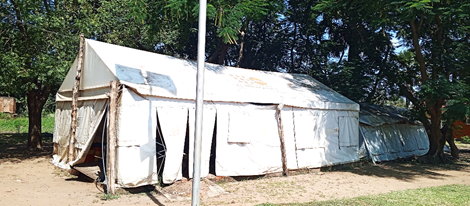DRDIP, WFP New Partnership
 |
| DRDIP Project Manger, Caro Brenda Lorika & WFP Staff chat with beneficiaries in West Nile |
The eight districts of intervention include;
Adjumani, Moyo, Yumbe, Obongi, Terego, Koboko, Arua and Madi Okolo. These are
districts where DRDIP has substantial investments through livelihoods support,
infrastructural development and environment conservation. The PLW beneficiary
category that CBT-Plus targets are also members of the DRDIP livelihoods
structures who part-take in project implementation through Labour Intensive Public
Works (LIPW) approach.
CBT-Plus is anchored on the WFP, Child Sensitive Social Protection (CSSP)
project, a three-year 50 million dollar activity that focuses on reducing stunting
figures in the West Nile region from the current 34% (UBOS, 2016) to at least
30% by 2024.
DRDIP Project Manager, Caro Brenda Lorika
describes the partnership as “a new dawn” for the government flagship project. Caro
noted that nutrition sensitive social protection is mentioned quite often in Uganda
but not given enough attention.
“The coming of WFP to partner with DRDIP
is a blessing, it will supplement our work and help reduce the level of
malnutrition and stunting of children in West Nile”, she said. The Project Manager
spoke during numerous consultative meetings organized by WFP in the eight
districts of focus recently. The
meetings were aimed at bringing key district stakeholders up-to speed with the CBT-Plus
ingredients and how the new project will capitalize on the already built DRDIP structures
to improve social protection status in the West Nile region.
According to Caro, the financial literacy
aspect of the CBT-Plus project will inspire beneficiaries to invest in
nutritional livelihoods. She believes that the use of Social and Behavioral
Change Communication (SBCC) –a mindset change approach that the project intends
to embrace is expected to trigger adoption of nutrition sensitive behaviors
among refugees and the host communities.
Brian Kiswii of WFP revealed that the four-year
project (2021-2024) will complement other Government initiated social
protection programs such as Social Assistance Grants for Empowerment (SAGE) which
is already catering for the elderly citizens under the Ministry of Gender
Labour and Social Development. He said the CBT-Plus program was conceived
following a recent study that rates West Nile region poorly in terms of cases
of poverty, anemia and stunting.
Yumbe District LCV chairperson,
Abdulmutakib Asiku is grateful for the additional support from WFP through
DRDIP structures. While pledging his support for the intervention in Yumbe,
Asiku recognized that the CBT-Plus approach is in line with the Government of
Uganda National Development Plan III ambition of improving income status of
households by strengthening community livelihood options.
Most district officials across technical
and political divide in West Nile emphasized the need to integrate SBCC
programming into project interventions so as to break the existing strong
social cultural barriers that have affected achievement of expected outcomes for
most projects in the region.
The CBT-Plus program aims to influence child nutrition from conception to 24 months of age, during the first 1000 days. This will be done through cash transfers by WFP to selected beneficiaries (PLW) from DRDIP watersheds. The project targets the poorest & most vulnerable households under DRDIP-LIPW funded sub projects in West-Nile districts.
The cash transfer provided is 15-25% of household
expenditure to a tune of UGX 48,000 per beneficiary per month for a period of
33 months with mandatory savings to support reinvestment into nutrition
livelihood activities for mother care groups. This approach will be reinforced
with trainings on financial literacy, social safeguards and SBCC. An official
launch of this program is expected in November.



Comments
Post a Comment